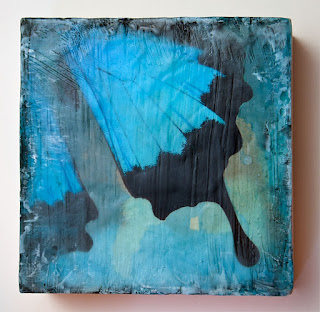What I did: I used a bleached white beeswax since this project was on a board. I brushed several layers on, crisscrossing each layer and using the heat gun between each layer. I wanted to muck up the corners a bit so I mixed some paint to be the same color as the butterfly and thinned it with a lot of the plain beeswax. The result was too clean so I started playing with using an old credit card to scrape on more layers. I added some black and some white as well as the blue. I cleaned up the edges a bit and stopped there for the evening. The next day the wax was much more translucent and I buffed it to a shine with a cloth. I used a black oil pigment stick around the outside edges to accentuate the texture. After I applied and rubbed it all around, I used some odorless thinner to get the excess pigment off. It seemed to make some changes in the wax as well. I rubbed off some of the brushstrokes and everything became cloudy. I’ll have to do some research to see if it was the type of wax or the thinner but I didn’t have this problem the last time I did it in someone else’s studio. I waited to see if I could buff it back to a shine once it had rested for a bit. Luckily buffing did the trick and now I am trying to decide if I imagined the problem.
 |
| With just wax and encaustic paint. |
 |
| After applying the oil stick. |
What I learned:
You can use a brush and the heat gun together to add some nice texture if you didn’t get what you wanted with the original application.
It’s handy to have some extra pieces of 4 ply mat board around to try ideas and test colors before you work on the real piece. Here’s an ATC card I made while futzing around with ideas. I made the circles using the eraser of a pencil.
 |
| Artist Trading Card (2.5" x 3.5") |
The last decision is to figure out how I want to finish the sides. I could paint them black with an acrylic paint or maybe stain them a nice dark brown. I like the outcome of the piece and I’d like to make a much larger version down the road.




No comments:
Post a Comment